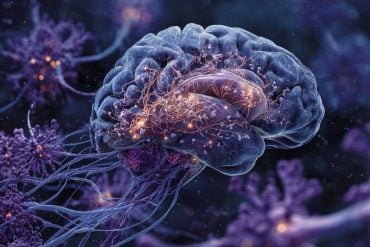Summary: Your personality traits might indicate whether you are at an increased risk of developing Alzheimer’s disease as you age. Those who are less agreeable and more confrontational appear to have better neuroprotection against the disease. Lower agreeableness was associated with lower brain volume loss in the hippocampus, entorhinal cortex, and other areas linked to memory. Higher openness was also associated with lower brain volume loss in the hippocampus. The data suggests a combination of lower agreeableness and higher openness could be independent predictors of the preservation of brain volume in areas vulnerable to neurodegeneration.
Source: University of Geneva
Alzheimer’s disease, the main cause of dementia in the elderly, is a neurodegenerative disease caused by the irreversible destruction of neuronal networks in certain brain structures affecting memory. While some risk factors are known, such as hypertension or diabetes, the potential role of non-biological factors begins to be discovered.
Scientists from the University of Geneva (UNIGE) and the University Hospitals of Geneva (HUG), Switzerland, demonstrated, through brain imaging and psycho-cognitive evaluations conducted over several years on a community-based cohort of elderly people, that certain personality traits protect brain structures against neuro-degeneration. Among them, people who are less agreeable but with a natural curiosity and little conformism show better preservation of the brain regions that tend to lose volume, both in normal aging and in Alzheimer’s disease. These results, to be discovered in the journal Neurobiology of Aging, highlight the importance of taking personality into account in neuropsychiatric disorders and pave the way for more precise prevention strategies against neurodegeneration.
For several decades, Alzheimer’s disease specialists have been trying unsuccessfully to develop therapeutic vaccines that could repair brain damage caused by the accumulation of amyloid—a small protein that, in large numbers, is harmful to the central nervous system—and the resulting destruction of neurons. Today, a new avenue of study is beginning to be explored: would it be possible to limit the damage by acting on non-biological factors? Are some individuals more protected than others because of their personality or way of life?
“Between the destruction of the first neurons and the appearance of the first symptoms, 10 to 12 years elapse,” says Professor Panteleimon Giannakopoulos, a psychiatrist at the UNIGE Faculty of Medicine and Head of the Division of Institutional Measures at the HUG, who has directed this work. “For a long time, the brain is able to compensate by activating alternative networks; when the first clinical signs appear, however, it is unfortunately often too late. The identification of early biomarkers is therefore essential for an effective disease management.”
A follow-up of several years
To this end, the specialists recruited a large cohort of people over 65 years of age in a longitudinal study. Various methodologies were used, including functional and structural brain imaging, to assess amyloid accumulation and brain volume. Atrophy of certain brain regions is indeed one of the major features preceding memory loss and Alzheimer’s disease.
“In order to get as complete a picture as possible, we decided to look at the non-lesional determinants of brain damage, i.e. the environment, lifestyle and psychology,” says Professor Giannakopoulos. “So we conducted cognitive and personality assessments.” To ensure the statistical validity of their work, they used a restrictive model to control for possible demographic, socio-economic or psychiatric bias. In the end, 65 people—men and women—were examined several times over a five-year period.
A plea for selfishness?
The results are surprising: people who are unpleasant, who are not afraid of conflicts and who show a certain anti-conformity have better-protected brains. In addition, this protection takes place precisely in the memory circuits that are damaged by Alzheimer’s disease.

“A high level of agreeableness characterizes highly adaptive personalities, who want above all to be in line with the wishes of others, to avoid conflict, and to seek cooperation,” notes the specialist. “This differs from extraversion. You can be very extroverted and not very pleasant, as are narcissistic personalities, for example. The important determinant is the relationship to the other: do we adapt to others at our own expenses?”
Open-mindedness is also important
Another personality trait seems to have a protective effect, but in a less clear-cut way: openness to experience. “This is less surprising, as we already knew that the desire to learn and interest in the world around us protects against cerebral aging.” But why? What are the biological mechanisms at work? For the moment, this remains a mystery, which the Geneva team would like to decipher, as does the stability of their observations.
Indeed, does the phenomenon last for decades? And how can these results be used for prevention purposes? “If it seems difficult to profoundly change one’s personality, especially at an advanced age, taking this into account in a personalized medicine perspective is essential in order to weigh up all the protective and risk factors of Alzheimer’s disease. It is an important part of a complex puzzle,” the authors conclude.
Source:
University of Geneva
Media Contacts:
Press Office – University of Geneva
Image Source:
The image is in the public domain.
Original Research: Closed access
“Less agreeable, better preserved? A PET amyloid and MRI study in a community-based cohort”. Panteleimon Giannakopoulos et al.
Neurobiology of Aging doi:10.1016/j.neurobiolaging.2020.02.004.
Abstract
Less agreeable, better preserved? A PET amyloid and MRI study in a community-based cohort
The relationship between personality profiles and brain integrity in old age is still a matter of debate. We examined the association between Big Five factor and facet scores and MRI brain volume changes on a 54-month follow-up in 65 elderly controls with 3 neurocognitive assessments (baseline, 18 months, and 54 months), structural brain MRI (baseline and 54 months), brain amyloid PET during follow-up, and APOE genotyping. Personality was assessed with the Neuroticism Extraversion Openness Personality Inventory-Revised. Regression models were used to identify predictors of volume loss including time, age, sex, personality, amyloid load, presence of APOE ε4 allele, and cognitive evolution. Lower agreeableness factor scores (and 4 of its facets) were associated with lower volume loss in the hippocampus, entorhinal cortex, amygdala, mesial temporal lobe, and precuneus bilaterally. Higher openness factor scores (and 2 of its facets) were also associated with lower volume loss in the left hippocampus. Our findings persisted when adjusting for confounders in multivariable models. These data suggest that the combination of low agreeableness and high openness is an independent predictor of better preservation of brain volume in areas vulnerable to neurodegeneration.






